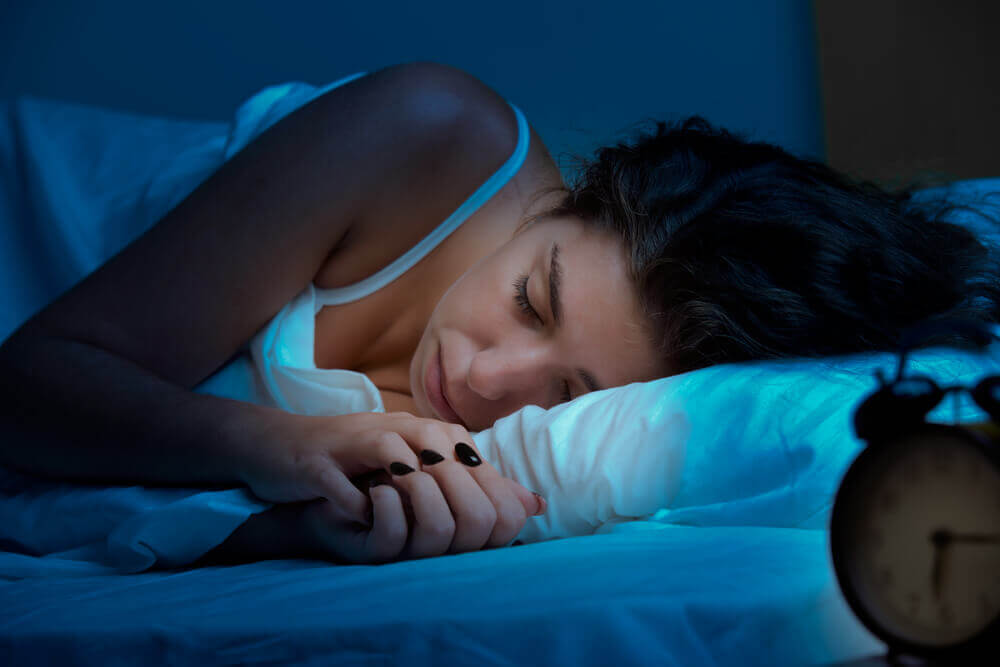How to Regulate Melatonin and Sleep Better


Reviewed and approved by the doctor Karla Henríquez
We’ll explain just how you can do this in this article.
What you need to know about melatonin

First off, it’s fundamental to know the basics about this important hormone.
Melatonin carries out many specific functions such as regulating the sleep cycle. It’s produced at night in the pineal gland, which is located in the brain.
At night, Melatonin:
- Maintains your heartbeat and blood pressure.
- Relaxes your retinas.
- Helps to release free radicals.
The gland sends the hormone throughout the body and it synchronizes with your heart rate. When your melatonin levels are normal, you can sleep and rest properly.
The main problem with this hormone happens when its levels decrease. This usually happens when you are stressed while following a poor diet, living an excessively sedentary lifestyle or exposing yourself to too much artificial light at night.
What comes next? Insomnia.
Furthermore, melatonin stimulates the production of the growth hormone as well as the hormones for tissue and muscle repair.
It’s aid in growth and repair is why we need to sleep more as children than we do as adults. Our bodies also “ask” us for more sleep when we’re sick or training too much at the gym.
As if all that wasn’t enough, melatonin also performs the following functions:
- Regulates appetite.
- Plays a role in the development and function of the testicles and ovaries.
- Acts as a power antioxidant.
- Strengthens the immune system by inhibiting certain viruses and bacteria.
Want to know more? Read: 8 Foods that Boost Your Immune System
Melatonin and Seratonin

While we could say that these are “opposite” hormones, they act together, which is why we need normal levels of both hormones.
- In the same way that melatonin production increases in darkness, serotonin production increases in light.
- Our retinas capture sunlight and that light reaches the pineal gland. When that happens, melatonin production stops and the gland starts to make serotonin.
The opposite happens when we are in dark surroundings.
It’s crucial to understand that artificial light can’t substitute the sun’s natural function.
This can explain why we want to stay at home or rest during the winter more often, while in the summer, we wake up with more energy and do more activities (apart from the temperature, of course).
When we don’t have the sufficient levels of serotonin, our body begins to crave high-calorie or unhealthy food: cookies, candies, chocolate, ice cream, etc.
Meanwhile, a lack of melatonin leaves us with insomnia and sleeping problems. At the same time, an excess can lead to drowsiness, apathy, weakness, etc.
We should also mention another very “popular” hormone in order to understand the importance of melatonin and serotonin: cortisol.
Cortisol is known as the “stress hormone.” As its name suggests, it’s in charge of raising and decreasing stress symptoms. In addition, it also has a notable impact on the sleeping and waking processes.
Under stress, there are people who need to sleep more and there are also those who can’t shut eye the entire night.
It can be explained by cortisol balancing the production of the hormones responsible for resting or taking action.
Foods that increase melatonin production
A healthy diet is essential for normalizing melatonin levels and for sleeping the 7 to 8 recommended hours every night.
Above all, tropical fruits, like pineapple, or citric fruits, like oranges, are highly recommended.
You can also help your body produce more melatonin by eating:
- Dried fruit
- Eggs
- Fish
- Legumes
- Oats and barley
- Corn
- Rice
To improve your melatonin levels even more, add these to your plate, as well:
- Tomatos
- Potatos
- Red wine
- Dairy products
- Tuna
Habits for regulating melatonin levels
In addition to eating a balanced and healthy diet, we recommend some habits that can be useful for leveling out melatonin levels:
1. Sleep in a dark room
Your room should have shutters or curtains that block light from coming inside. This includes street lights.
Dimmed lights signals to the brain that “it’s time to sleep”. A dark room ensures a more pleasant and replenishing sleep.
Visit this article: 8 Foods for a Health Brain
2. Don’t watch television before sleeping

Aside from the bright screen, you should keep in mind that certain scenes, sounds or news “wake up” the mind and prevent it from easily entering a resting state.
This is exactly why it’s a good idea to not keep a television in your bedroom in order to regulate melatonin. The same goes for phones. Use them at a maximum of an hour before heading to bed.
3. Exercising in the evening
Exercise is great for your health, and nobody can deny it. However, when you exercise at night, your body and mind stays in “alert” mode for longer, making it harder to get tired.
It’ll be harder to wake up in the mornings if your body doesn’t get enough time to repair the damages caused by the physical activity.
It’s better to finish all physical activity before the evening in order to get proper rest.
All cited sources were thoroughly reviewed by our team to ensure their quality, reliability, currency, and validity. The bibliography of this article was considered reliable and of academic or scientific accuracy.
- Bustamante-Montes, P., Lizama-Soberanis, B., Olaíz-Fernández, G., & Vázquez-Moreno, F. (2001). Ftalatos y efectos en la salud. Revista Internacional de Contaminacion Ambiental.
- De Argila Fernandez-Duran, D. (2010). Cáncer de piel. Medicine. https://doi.org/10.1016/S0304-5412(10)70019-6
- Allevato, M. (2006). Cosméticos-maquillajes. 200 | Act Terap Dermatol.
- Pop, A., Kiss, B., & Loghin, F. (2013). Endocrine disrupting effects of butylated hydroxyanisole (BHA – E320). Clujul medical (1957), 86(1), 16–20.
-
Darbre PD, Aljarrah A, Miller WR, Coldham NG, Sauer MJ, Pope GS. Concentrations of parabens in human breast tumours. J Appl Toxicol. 2004;24(1):5-13. doi:10.1002/jat.958
-
National Toxicology Program, Public Health Service, National Institutes of Health, US Department of Health and Human Services. NTP toxicology and carcinogenesis studies of triethanolamine (Cas No. 102-71-6) in B6C3F1 mice (dermal studies). Natl Toxicol Program Tech Rep Ser. 2004;(518):5-163.
- Braun, J. M., Sathyanarayana, S., & Hauser, R. (2013). Phthalate exposure and children’s health. Current opinion in pediatrics, 25(2), 247–254. https://doi.org/10.1097/MOP.0b013e32835e1eb6
This text is provided for informational purposes only and does not replace consultation with a professional. If in doubt, consult your specialist.








